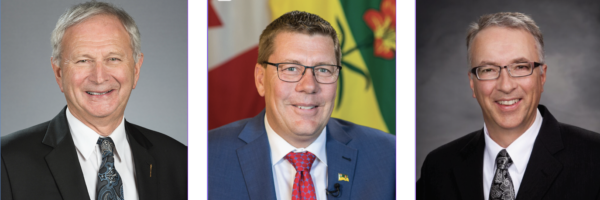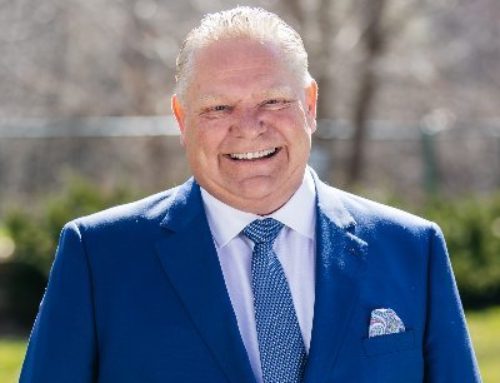Paul Tuns:

From left: New Brunswick Premier Blaine Higgs, Saskatchewan Premier Scott Moe, and B.C. Conservative Party leader John Rustad, have all become champions for parental rights in the face of LGBTQ extremism in schools, although none of the three has vowed to place any limits on abortion, an area of provincial jurisdiction.
Three provinces representing nearly one-fifth of the country’s population will hold general elections between Oct. 19-28. British Columbians will vote on Oct. 19, New Brunswickers will vote on Oct. 21, while voters in Saskatchewan will go to the polls on Oct. 28.
While none of the mainstream parties are providing pro-life leadership, the right-of-centre parties are making strong stands in favour of parental rights in education.
New Brunswick Premier Blaine Higgs has championed parental rights in education by amending Policy 713 which sets out requirements for public schools and school districts. In June 2023, Higgs directed the N.B. Ministry of Education to require parental permission for social transitioning – using preferred pronouns and opposite-sex names — of children under 16 in the province’s schools. The policy is being challenged by the Canadian Civil Liberties Association, which claims the changes violate the Charter rights of students who identify as LGBTQ.
The move led to a mini revolt within the party with several cabinet ministers opposed to the move replaced by Higgs loyalists and calls for Higgs to step aside from a handful of Progressive Conservative riding association executives. Higgs threatened to call an early election if the party did not back him on the policy change which quelled the public opposition from within his party. 15 months later, nearly a third of the PC caucus is not running for re-election with many citing amending Policy 713 as the reason for retiring from provincial politics.
While the PCs had fallen behind the Liberals in the polls prior to the policy shift, it has closed the gap since. Lindsay Jones of the Globe and Mail described the policy dispute “as perhaps the key issue in the next election” and if polls are to be believed, parental rights have not hurt Higgs. An Angus Reid poll in August 2023 found that in Atlantic Canada, one-third of people support informing parents and obtaining parental consent to transition a minor while another third supported informing parents of their children’s desire to change gender. Only 22 per cent of respondents thought parents should not be informed.
A notable candidate running for the NB Progressive Conservatives is Christian activist Faytene Grassechi, who cited Higgs’s parental rights position as something she liked about his leadership. Higgs has not repudiated the outspoken activist seeking and winning the party’s nomination in the riding of Hampton-Fundy-St. Martin’s.
Furthermore, the Higgs government has stood up to pressure from pro-abortion activist groups and the federal government of Justin Trudeau in refusing to fund Clinic 554, a private abortion mill in Fredericton. The Higgs government said that abortion was available at three provincial hospitals and there was no need to fund the private abortion and transgender medicine facility. Provincial law requires two doctors sign off on any procedures done outside hospital settings in order to be recompensed by the province.
Higgs was first elected premier in 2018 and won re-election in 2020. In 2020, the PCs won 27 seats compared to 17 for the Liberals, 3 for the Green Party, 2 for the People’s Alliance.
Steve Outhouse, who was campaign manager for former federal Conservative Party leadership contenders Pierre Lemieux and Leslyn Lewis in 2017 and 2020 respectively, both pro-life, was brought in by Higgs to run the party’s re-election campaign and be his chief of staff.
A Nanos poll in July, had the Liberals and Conservatives tied at 36 per cent support with 14 per cent for the Green Party, 10 per cent for the NDP and five per cent for the People’s Alliance.
In Saskatchewan, Premier Scott Moe also legislated parental rights in 2023, going so far as to pass legislation pre-emptively invoking the notwithstanding clause to thwart any Charter challenge to the new law. Just weeks prior to the beginning of the 2023-2024 school year, the Moe government hurriedly passed a law requiring parental consent when students want to use a chosen name or gender identity at odds with their biological sex. The government also outlawed third-party classroom presentations and literature, thereby banning Planned Parenthood from indoctrinating children after it was revealed that sexually graphic content from the organization was provided in a presentation the group gave to one school.
According to Angus Reid, parental rights was even more popular in Saskatchewan than New Brunswick, with fully half saying parents should be informed and give consent to any social transitioning of children at school, 33 per cent supporting informing parents, and just 10 per cent saying parents should be left in the dark about gender decisions their children make at school.
The Saskatchewan Party has governed the province since 2007 with Moe replacing Brad Wall as premier in 2018. Moe won a majority in 2020, winning 48 seats compared to the NDP’s 14.
Recent polls show the race is essentially tied.
In British Columbia, the political story of the past two years is the rise of the Conservative Party under leader John Rustad.
In February 2023, a Research Co. poll had the BC Conservatives at two per cent and was one of the few companies that bothered including the party in their surveys. Rustad left the B.C. Liberal Party later that month to become the B.C. Conservative Party’s first sitting MLA since 1979 and he was acclaimed leader on March 31. In April, the party was polling four per cent.
That Spring, the provincial Liberals, who had traditionally been home to social conservatives in the province, was purging pro-life and pro-family members, began imploding, and rebranded themselves B.C. United.
After Conservative leader Rustad began talking about trans issues and parental rights and the former Liberal Party was having its troubles, a July 2023 Leger Poll had the B.C. Conservatives at 16 per cent, jumping over the Green Party for third among public support and gaining on the second place B.C. United. By August and September, multiple polling firms had the B.C. Conservatives in second place.
In September, Bruce Bannon joined Rustad as the party’s second MLA after leaving B.C. United. During the opening legislative session in October, both Rustad and Bannon asked questions about Sexual Orientation and Gender Identity policies in schools, with Bannon cut off after reading from a text available in school that the assembly’s speaker considered too lewd for the legislature. Rustad introduced a private member’s bill to protect women from encountering biological males who identify as female or transgender in intimate settings or facing such competition in female-only sports. The bill was defeated with the NDP and most of B.C. United opposed to it.
B.C. United and the B.C. Conservatives are seen by some political observers as dividing the anti-NDP vote and there were talks to cooperate in the provincial election but those talks broke down. Since then, three other B.C. United MLAs have crossed the floor to join the Conservatives, bringing the party’s caucus membership to five. That is the largest B.C. Conservative Party caucus since Herbert Anscomb was elected premier under the party banner in 1949, winning 39 of 48 seats.
In the 2020 B.C. election, the NDP won 57 seats compared to 28 for the then Liberal Party, and two for the Green Party. The Conservative Party did not win any seats in 2020, garnering just 1.91 per cent of the vote. Since 1980, the party has won between 0.03 per cent and 4.76 per cent of the popular vote. Rustad seems likely to do much better.
Since June of this year the Conservatives have been only a few percentage points behind the NDP and an August 15-17 Mainstreet Research poll had the Conservatives leading the NDP 39-36 per cent, with B.C. United and the Green Party trailing at 12 and 11 per cent respectively.
Campaign Life Coalition national president Jeff Gunnarson said that while none of the centre-right leaders in New Brunswick, Saskatchewan, or British Columbia are pro-life, some of their candidates are and those people deserve the support of pro-life voters. He encouraged people to check out the CLC website to learn more about the provincial candidates and to vote pro-life and pro-family in the October elections.




